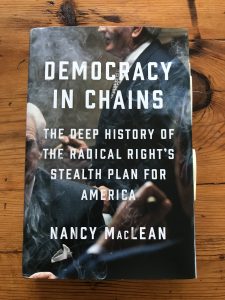Every new year’s ritual involves reflecting on where we’ve been and looking ahead to where we may be headed. Rarely though, is this ritual engaged in any meaningfully critical sense. Instead, it’s the ubiquitous new year’s resolution. This year is no exception but what feels different, or at least more intensely amplified, is a dark foreboding held in a creative tension with the potential for radical change. Now two years in, the pandemic is deepening its roots, sometimes twisted roots, into the soil of a fracturing society. The climate lurches closer to the edge of no return and people are struggling in their daily lives everywhere as we witness obscene wealth and it’s spaceshot joy rides. Yet thus far, nothing changes. In the early weeks of the pandemic, the Indian writer Arundhati Roy concluded an essay in the Financial Times with an observation and a question that’s more relevant and urgent with each passing day:
Historically, pandemics have forced humans to break with the past and imagine their world anew. This one is no different. It is a portal, a gateway between one world and the next. We can choose to walk through it, dragging the carcasses of our prejudice and hatred, our avarice, our data banks and dead ideas, our dead rivers and smoky skies behind us. Or we can walk through lightly, with little luggage, ready to imagine another world. And ready to fight for it (Roy 2020).
Twenty months later, it seems like we haven’t walked through the portal. It seems like we failed to imagine and strive for better on the other side. It seems like we’re weighted down and overburdened in so many ways in daily life (e.g. childcare, medical bills, student loans, youth mental health, and the long list every household encounters in some fashion on its own). But these failings, if that’s what they are, shouldn’t be attributed to weak individuals. Rather, it seems to be corporate algorithms of the tech giants, complicit corporate media, consumer culture, money in politics, privatization, voter suppression, social abandonment, the death of important educational and social institutions and so much more that are purposefully orchestrated to shape public beliefs conditioned on fear, acquiescence and disimagination. In other words, truth is cleverly shrouded by the self-serving interests of profit and power. 
The barriers on their kill list in order of priority (MacLean 2017, 230–32):
1. The environmental movement
2. “Social Security, Medicare and Medicaid, employer-provided pensions and insurance”
3. Progressive taxation, which translated into redistribution of wealth in the direction not favoring their ongoing accumulation.
4. Public schools
5. Feminism because the men in their society found women to be “heavily socialistic for no apparent reason.”
With this understanding, witnessing the right’s war on women now gains some deeper context that locates that “war” much deeper than abortion. War on critical thought, on women’s agency, on public education and indeed, anything public. In short, everything that matters for wellbeing and democracy. I see community-owned renewable energy as being firmly located in this democratic publics frame.
Their working definition of socialism:
…was synonymous with any effort by citizens to get their government to act in ways that either cost money to support anything other than police and military functions or encroached on private property rights (MacLean 2017, 194–96).
The problems we’ve got to solve in 2022 are a lot bigger and more complex than any one community solar project (in AIRE’s case) will solve. But every community effort no matter how large or small is a piece of the solution at the most basic common denominator– the intersection of energy and climate, democracy, peace, resilience and transformation.
Yes there are inspiring projects and people everywhere but can these community-based efforts collectively hold the line against cruel and well fortified systems of domination that fan the flames of the pandemic and literally the planet? The new year 2022, it seems, is likely to reveal to us a lot. I guess we better buckle up.
Happy New Year!
—–
Sources:
MacLean, Nancy. 2017. Democracy in Chains: The Deep History of The Radical Right’s Stealth Plan for America. New York, NY: Viking.
Roy, Arundhati. 2020. “Arundhati Roy: ‘The Pandemic Is a Portal’”. Financial Times, April 3, 2020. https://www.ft.com/content/10d8f5e8-74eb-11ea-95fe-fcd274e920ca.